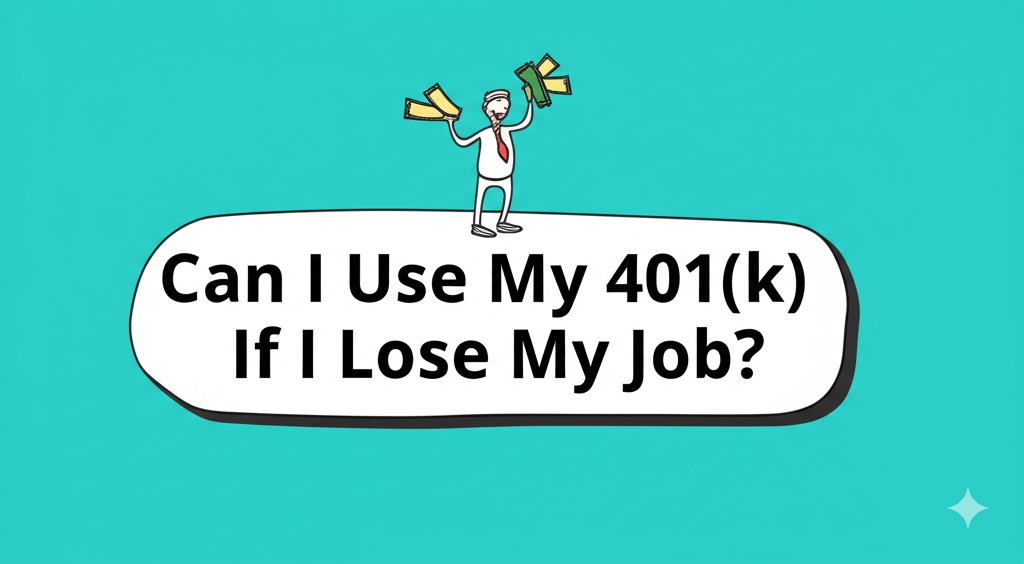
Losing your job can be incredibly stressful, especially when you’re worried about how to make ends meet. If you have a 401(k) retirement account, you might be wondering: “Can I use my 401(k) if I lose my job?” The short answer is yes—but with some important caveats. In this guide, we’ll walk you through what happens to your 401(k) when you leave a job, how and when you can access the funds, and the pros and cons of using your retirement savings during tough times.
What Happens to Your 401(k) When You Lose Your Job?
Your 401(k) account remains yours even after employment ends. The money you’ve contributed, along with any vested employer contributions, stays in the account unless you decide to move or withdraw it. Here’s what you need to know:
- The account stays active unless your employer has specific rules about small balances.
- Vested funds are yours to keep. Unvested employer contributions may be forfeited.
- You can leave the money where it is, roll it into an IRA, or transfer it to a new employer’s plan.
Understanding your options is crucial for protecting your retirement savings.
Can You Access Your 401(k) Funds After Losing a Job?
Yes, but there are limitations and potential penalties. Here are the main ways you can access your 401(k) funds:
1. Withdrawal
You can choose to withdraw money from your 401(k), but:
- If you’re under age 59½, you may face a 10% early withdrawal penalty.
- You’ll owe income tax on the amount withdrawn.
- Some exceptions may apply, such as substantially equal periodic payments (SEPP) or total disability.
2. 401(k) Loan
Loans are only available if you’re still employed, so once you’ve lost your job, you can’t take out a new loan. If you already had a loan:
- You’ll usually have a short repayment window (often 60 to 90 days).
- If not repaid, the loan becomes a taxable distribution and may trigger penalties.
3. Hardship Withdrawal
Some plans allow for a hardship withdrawal under specific circumstances, such as:
- Preventing foreclosure or eviction
- Paying for medical expenses
- Covering funeral costs
These withdrawals still involve income tax, but penalties may be waived depending on the situation.
Alternatives to Withdrawing From Your 401(k)
Before tapping into your retirement savings, consider these alternatives:
- Unemployment benefits: These can help cover basic expenses while you job-hunt.
- Emergency savings: Use your cash reserves if you have them.
- Side gigs or freelancing: Generate short-term income without jeopardizing your future.
- Roth IRA contributions: If you have a Roth IRA, you can withdraw contributions (but not earnings) without penalties.
Preserving your 401(k) can help safeguard your financial future.
Should You Cash Out Your 401(k)? Pros and Cons
Pros
- Immediate access to funds in a financial emergency
- No repayment obligation like a loan
Cons
- Taxes and potential penalties
- Reduces your retirement savings
- Missed opportunity for compound growth
In most cases, it’s best to treat your 401(k) as a last resort.
Rolling Over Your 401(k) After Job Loss
If you’re not in immediate need of the funds, rolling over your 401(k) can be a smart move. You have two main options:
1. Roll Over to an IRA
- Gives you more investment choices
- May offer lower fees
- Keeps your money growing tax-deferred
2. Roll Over to a New Employer’s Plan
- Keeps all retirement funds in one place
- Easy to manage once you’re re-employed
Tip: Always opt for a direct rollover to avoid tax withholdings.
Final Thoughts: Use Your 401(k) Wisely During Unemployment
So, can you use your 401(k) if you lose your job? Yes—but whether you should depends on your situation. Withdrawing funds can offer short-term relief but may harm your long-term financial health.
Whenever possible, explore alternative resources first and consider rolling over your funds to preserve your retirement savings. If you do decide to tap into your 401(k), understand the tax implications and look for penalty exceptions.

Andre Cuevas provides career insights, job search strategies, and professional advice to help individuals navigate the job market and achieve their career goals.






